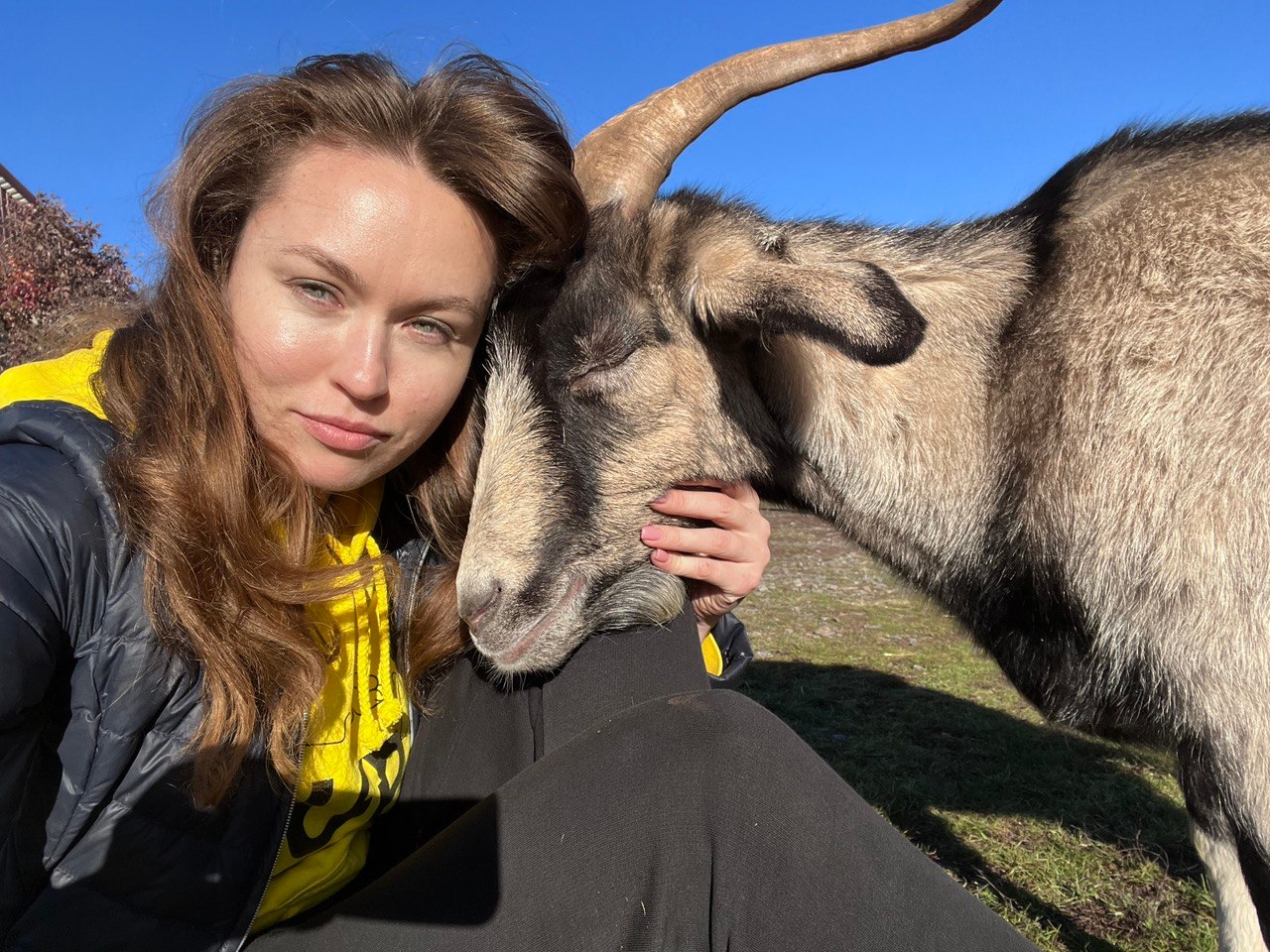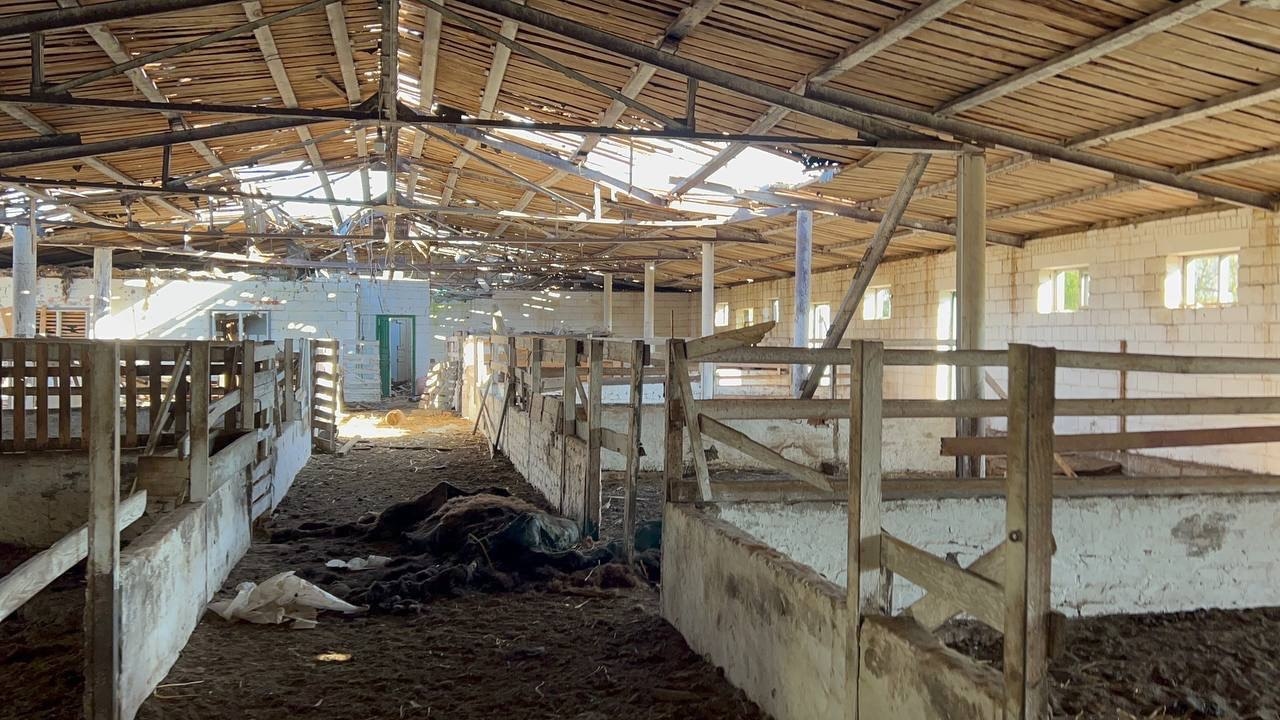How volunteers risk their lives to rescue abandoned animals amid war

When Ukrainian soldiers were entering the village of Yampil in Donetsk Oblast after five months of Russian occupation, they discovered an abandoned zoo on the outskirts.
Dozens of animal corpses, either killed by Russian troops or dead of starvation, were lying throughout the zoo’s territory. But in one locked cage, they noticed an animal that was still fighting for its life.
"(The bear) was in terrible condition. Five more days and we wouldn't have saved him," says Olena Bila, a volunteer who came to the bear’s rescue in late September, shortly after Ukrainian soldiers called for volunteers to help.
When Bila arrived at the site, she saw the bodies of killed wolves, foxes, and empty cages that she believed had belonged to lions. She found the bear locked in a tiny cell, neglected, thin, and "drowning in his excrement."
"He was concussed," Bila says, adding that a shell had exploded near his cage. "It was hard to look at."
Bila and her team had to act quickly to move the animal, since Russian troops could open fire against the liberated village at any moment. Luckily, the mission was successful. Bila says the bear now lives in "good conditions" at a zoo in the Polish city of Poznan and feels better.
They named him Yampil after the village he was found in.
According to the United Nations, over 13 million Ukrainians have been forced to flee their homes since the beginning of Russia's all-out war, including 7 million refugees and 6.5 million internally displaced. Countless animals were left behind, forced to fight for survival amid Russian attacks and cold weather.
For many of them, the only chance to survive is to be rescued by Ukrainian volunteers, who risk their lives traveling to front-line settlements and liberated territories to save abandoned cats and dogs, farm animals, and wild ones.
"Most humanitarian missions and charities are aimed at helping people, and I can understand that," says volunteer Kateryna Arisoy.
"But I believe that all creatures deserve to live," she adds.
"(Animals) suffer no less than people, and in some cases — even more."
'Ukrainians who care'
For Arisoy, the battle to save animals started over a decade before Russia launched its full-scale invasion of Ukraine. In 2011, she co-founded a small animal shelter in her home town of Bakhmut, Donetsk Oblast.
"I was so naive to think that we had already survived the hardest times (the Russian invasion of Donbas in 2014-2022)," Arisoy says, adding that she had never expected the all-out war to hit Bakhmut so hard.
She fled Bakhmut in April amid non-stop Russian attacks but well before it became the focus of some of the heaviest fighting along the entire front line. Since then, she has returned to the city multiple times to help animals, “those who can't ask for help."
In the city of Dnipro, where Arisoy temporarily found a new home, she joined the Vetmarket Pluriton, a team of volunteers that help and rescue animals affected by the war. Arisoy says volunteers often get calls from locals telling them where the help is needed.
The volunteers started by rescuing animals from the liberated towns of Irpin and Bucha outside Kyiv. When fighting intensified in the east of Ukraine, they began traveling to Bakhmut and other settlements in the area.
Bila, on the other hand, was "far from volunteering" before the full-scale invasion: In the early days of the war, she and her husband had to shut down their small business in Kyiv Oblast and "devote themselves to helping others" by joining the team of UAnimals, a nonprofit that advocates for animal rights.
On March 8, during one of their missions near the capital, Ukrainian soldiers showed them a small wounded puppy that had recently come to them.
"We took him and started treating his wounds," Bila says. "When you look into his eyes, you can drown. We decided to keep him."

The puppy turned out to be a Bernese Mountain Dog. They named him Baron. He has accompanied them during every "evacuation, under shelling, and in all the front-line hot spots."
"He goes ahead of us during rescue missions," Bila says. "He is always on alert. When we are loading animals (into their mini-bus), and he hears (shells) flying towards us, he starts barking, warning us to hide."
During another mission, they once stopped at a gas station, where a Ukrainian family with a little daughter spotted a cute puppy the couple had just rescued from a war-torn settlement.
"We offered for them to take that puppy, but they refused, saying it was too big of a responsibility," Bila says.
After they had driven 100 kilometers from the gas station, a car appeared behind them and honked for them to stop in the middle of the highway.
"It was the same family we had offered the puppy," Bila says. "When we left, the girl started crying, persuading her parents to keep it. So they chased us for more than 100 kilometers to get this puppy. It was adorable," she adds.
In September, Bila went to the liberated city of Izium in Kharkiv Oblast. She says Ukrainian soldiers rescued 10 dogs there and decided to adopt all of them into their families.
"We brought the dogs to their new families, not shelters," Bila says. "They are happy now, waiting for the soldiers to return."
"There are many Ukrainians who care about animals, even despite the horrors of the war," Bila adds.
Striking difference
Seeing Ukrainian soldiers treat animals kindly and rescue them amid heavy fighting touches Bila's heart deeply.
"Our soldiers are humane, kind-hearted, and brave. If they see that an animal needs help, even if it's in a dangerous place, they will still try to save it," she says.
"That distinguishes our soldiers (from the Russian troops)," she adds.

Volunteers say that the difference is especially striking in the settlements liberated from the Russian occupation.
When Arisoy visited the Yampil zoo and the nearby nature reserve shortly after the area’s liberation, she was shocked to see what Russians left of the place she used to enjoy.
"Russian soldiers were based there during the occupation. Most of the animals died of hunger or from shelling," she says.
"But Russians also ate many animals," she says, adding that they learned about that from locals.
Upon arrival at the reserve, Arisoy saw "skins, torn-off heads, and bones" of a deer, ostrich, and bison. There, she also saw the remains of her "favorite alpaca."
"As soon as I saw the skin, I immediately recognized who it was and almost fainted," she says.
Out of nearly 200 animals at the zoo and the reserve, only two horses, four donkeys, a couple of pigs and six piglets, a lama, a wild bear, a goat, a duck, and a cat survived the Russian occupation. Arisoy says volunteers evacuated them all.
At the zoo, she says they also found a corpse of a camel that died of starvation: "Only bones remained," Arisoy says.
Bila assumes Russian soldiers were also "killing animals for fun," as volunteers found wild animals "shot dead in their cages" at the zoo. She says it was the first time she saw animals that had been shot dead.
Though most of the animals they rescue have been abandoned by their owners escaping the war, there are some whose owners had been killed. From one of the liberated half-ruined settlements of Kharkiv Oblast, Bila rescued a dog with a litter of small puppies.
The dog's owner, a local veterinarian, was killed in a Russian airstrike on the village, she says. His house was destroyed, but his pets somehow survived the attack. Now, other volunteers take care of the pets and look for new homes for them.
There are countless similar stories all over Ukraine, Bila says. That's why she and her husband work almost non-stop to rescue as many as possible, often putting their lives in danger.
Risking lives
Arosoy says animal rescue missions during war mean constant threats to their lives.
"We come under fire all the time," she says, adding that a rocket fell in front of their car when they were driving near Bakhmut recently.
Bila agrees, saying that recently they evacuated five horses from a farm in liberated Kherson under the heavy shelling. When they were on a mission to rescue a bear from Bakhmut, a projectile fell nearly 10 meters away from them, Bila says. Luckily, it didn't explode.
"Something protects, perhaps, because we are on such a good mission — saving the lives of our animals," Bila says.

But Russian attacks are not the only threats the volunteers face.
"Three members of our team were taken prisoner by the Russian troops when they went to Lysychansk to evacuate children and a local animal shelter," Arisoy says.
Russian forces captured Lysychansk, the last Ukrainian holdout in Luhansk Oblast, after heavy fighting, in early July. Arisoy says their volunteers were in the city at that time. She can not disclose details but says they are still in captivity.
Despite the many challenges and risks they are facing, Bila says there "was not a second she regretted becoming a volunteer."
"It is so heartwarming when you save a life and see an animal that is grateful to you," she says.
"They can't say anything, but how they look at you shows gratitude for being saved."












